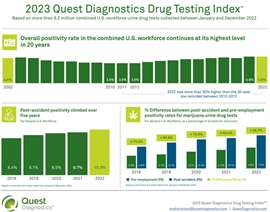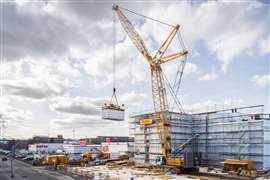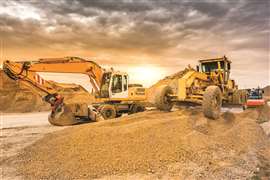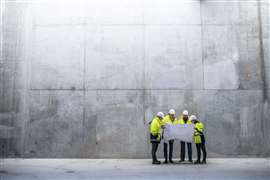Widening US marijuana legalisation creates challenge for construction companies
29 June 2023
 Image: guruXOX via AdobeStock - stock.adobe.com
Image: guruXOX via AdobeStock - stock.adobe.com
The widening legalisation of cannabis in the United States is creating a headache for construction contractors when it comes to hiring scarce new workers and testing their wider workforce.
The use and possession of cannabis is illegal under US federal law for any purpose.
But a total of 38 US states, four out of five permanently inhabited US territories, and the District of Columbia (DC) have all made the medical use of cannabis with a medical recommendation.
The recreational use of cannabis is legal in a further 23 states, three territories and DC.
Given the broadening acceptance of cannabis use in the US, it is perhaps unsurprising that the percentage of employees in the general workforce who test positive for marijuana after an on-the-job accident increased to its highest level in 25 years in 2022.
That’s according to analysis by Quest Diagnostics, which found that post-accident marijuana positivity of urine drug tests in the workforce was 7.3%. That compared to 6.7% in 2021 and follows a steady increase in the positivity rate every year since 2021.
While post-accident marijuana positivity figures aren’t available for the construction sector, overall drug positivity in the sector was 4.7% in 2022, according to Quest Diagnostics, up from 4.1%. Construction also carried the dubious honour of the highest rate of cocaine positivity at 0.33%.
Katie Mueller, a senior program manager at the National Safety Council, focusing on cannabis safety, said, “Intoxicating cannabis products, including marijuana, can have a major impact on safety at work and have been proven to slow reaction time, impact memory and impair skills essential to driving.
“State legalisation of the drug creates new challenges for employers.”
 Infographic: Quest Diagnostics
Infographic: Quest Diagnostics
Given the differences in the legislative approaches between states and territories, there is no national standard for drug testing of construction workers set by Washington.
Instead, companies’ testing regimes are driven by state regulations and the demands of the workers’ compensation insurance industry, Brian Turmail, vice president, public affairs & strategic initiatives at the Associated General Contractors of America (AGC), explains.
“Given the risks involved with working on an active construction site, firms cannot, and must not, be allowed to tolerate impairment on the job site,” he said.
But testing for impairment through marijuana is a challenge. Turmail asserted that there are “no good impairment tests for marijuana and other drugs”.
As a result of that, companies have to use tests that measure the history of drug use.
“[This] obviously makes it even harder to hire in an environment where labour is very tight and more and more states are allowing some form of marijuana use,” Turmail added.
Employers need to monitor changing landscape
The changing landscape means that employers with safety sensitive positions or who are subject to federally mandated compliance requirements need to stay on top of their policies and how they handle positive marijuana tests to ensure they follow the law at federal, state and local level.
Law firm Jackson Lewis points out that federal government contractors have extra issues to deal with.
For example, the Federal Department of Transportation (FDOT) prohibits all marijuana use in its regulated industries and does not authorise medical marijuana as a valid medical excuse for a positive drug test in a commercially licensed (CDL) driver.
Jackson Lewis advises companies holding federal contracts to review those contracts to determine whether they are required to conduct drug tests for marijuana.
When compliance with federal law is not indicated, employers have to follow state and local laws regarding marijuana use and testing.
Some states such as New York and Rhode Island prohibit drug testing for marijuana for any reason. New Jersey and Montana restrict testing, and in the City of Philadelphia, pre-employment testing is prohibited.
Meanwhile, more than 20 states protect lawful or prescription use of medical marijuana from discriminatory and retaliatory actions by employers.
Kathryn J. Russo, attorney at law at Jackson Lewis in New York, told International Construction, “The trend we are seeing in the US is that many employers are no longer including marijuana in a pre-employment drug test because there are more and more laws protecting off-duty use.
“Additionally, some employers are finding it difficult to hire candidates in states where marijuana is legal because many applicants will fail a drug test for marijuana. In many states, it still is permissible to test for marijuana post-hire, but a positive marijuana drug test does not necessarily prove marijuana impairment at the time of an accident. Employers should train their supervisors to recognize symptoms of impairment at work, because that may be the only way to address marijuana impairment in many states.”
When it comes to states and cities moving towards banning tests for marijuana use, Turmail made it clear that the AGC is strongly opposed to the idea.
He said, “Our position is that government officials should not take steps to prevent firms from ensuring they have a safe and drug-free work environment, particularly in an industry like ours where the potential risks of having an impaired person on a job are so extremely severe.”
He concluded, “We are agnostic on these marijuana laws, but we do zealously guard the industry’s ability to protect workers from the dangers of having an impaired colleague operating on a job site.”
STAY CONNECTED


Receive the information you need when you need it through our world-leading magazines, newsletters and daily briefings.
CONNECT WITH THE TEAM











